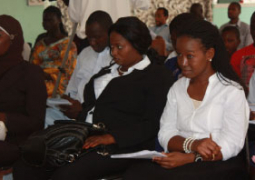The workshop is being attended by senior agriculture officials, including project coordinators, monitoring and evaluation officers and technicians.
The Ministry of Agriculture and the International Fund for Agricultural (IFAD), in collaboration with the European Space Agency (ESA) and SARMP, organsied the workshop courtesy of the Participatory Integrated Watershed Management Project (PIWAMP).
The main objectives of the workshop are to share the results of the pilot project with key stakeholders, discuss the benefits of using EO services and provide hands-on training to selected government and project staff on the application of EO technologies in The Gambia.
According to officials, the forum will focus specifically on creating clarity and detailed understanding by all actors on how to implement the project.
The workshop will further cover certain topics, such as technical principles, capability and cost of space-borne EO applications for land and resources survey, notably for land cover inventories, land cover change assessment and monitoring, land degradation assessments, topography and environmental protection.
It would also discuss forestry, disaster management and background information on applications with special emphasis on new capacities.
Participants would also be exposed to the overview of the potential advantages of using SAR data for specific applications such as the generation of digital elevation models, crop mapping and monitoring, land cover changes, forest fires impact assessment and burnt areas mapping, landside and subsidence monitoring.
In her official opening remarks, the permanent secretary at the Ministry of Agriculture, Ada Gaye, hailed IFAD for once again demonstrating its commitment to taking the lead in support of the development of the agricultural sector in The Gambia by initiating yet milestone collaboration between The Gambia and ESA.
According to her, the workshop aimed at monitoring key food crops and providing essential information for better planning and decision-making through earth observations and remote sensing.
She said further that the data collected from the crop monitoring project by ESA will be made available to government for accurate and timely information on rice crop area and production for application in planning and responses to natural catastrophes.
For his part, NEMA Director /PIWAMP coordinator, Momodou Gassama, expressed delight over the bilateral relationship between the Government of The Gambia and ESA in the use of earth observation as a means to monitor the performance of the country’s most important food crop, for choosing rice and other upland like millet and groundnut.
He also lamented the challenges affecting the Ministry of Agriculture which include lack of reliable data for agricultural production.
This capacity building workshop for service providers and the pilot programme will go a long in addressing that particular problem, he says, expressing hope that the partnership between The Gambia and ESA initiated by IFAD is another demonstration by the Fund of its continued efforts at developing agriculture production in the country.
Speaking earlier, Lamin A.D. Sanyang, chairperson of the country programme, who doubles as the coordinator of Livestock and Horticultural Development Project (LHDP), said IFAD is currently funding four projects in the country.
The projects, which are run through the government, include the Rural Finance Project, PIWAMP, LHDP and NEMA.
According to him, each of the projects has been given a mandate and will be judged according to performances agreed upon.
This is why the four projects are working very close so that all the necessary information are shared among themselves for further usage, he said.
Moses Abukari, country programme manager of West and Central Africa for IFAD, underscored the importance of the workshop.
He noted that ESA members are trying to explore its technologies in other countries, adding that they are not implementing their activities alone but collaborating with key partners across the world.



